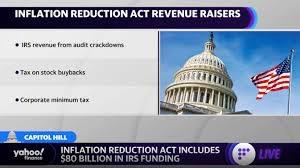 The so-called Inflation Reduction Act was passed by the Senate along party lines on Sunday August 7th using a reconciliation procedure, avoiding the 60-vote requirement. The Bill is scheduled to be considered by the House in a special session with expected passage. Effecively the legislation is directed at environmental remediation with investments to stimulate "Green" industries hopefully funded by corporate taxes.
The so-called Inflation Reduction Act was passed by the Senate along party lines on Sunday August 7th using a reconciliation procedure, avoiding the 60-vote requirement. The Bill is scheduled to be considered by the House in a special session with expected passage. Effecively the legislation is directed at environmental remediation with investments to stimulate "Green" industries hopefully funded by corporate taxes.
The expenditures outlined in the 750-page bill will be funded in part by a minimum 15 percent tax on corporations with a book value in excess of $1 billion and enhanced collection of taxes by the IRS. The expenditures included in the bill are heavily biased towards the environment and will include:
- Rebates for electric vehicles subject to manufacture in the U.S.
- Tax credits for expenditure on carbon-capture technology
- Investment tax credits for wind turbines and solar panels
- A program to reduce methane emissions together with penalties for non-compliance.
- Forest conservation and urban tree planting
- Promoting domestic production of biofuels
- Reinstating offshore oil and gas lease sales
- Development of emission-reduction technology
- Environmental and climate justice block grants to reduce air pollution
- Grants to homeowners to improve energy efficiency
- Rescinding the ban on offshore wind-power generation
The bill includes provisions to reduce the cost of drugs supplied under Medicare, allowing negotiation to reduce drug prices.
Legislation should have a beneficial impact on the cost of energy, although it is recognized that delays in implementation of projects will result in environmental benefits and lower cost of energy only in the intermediate term. The legislation allowed for ongoing use of coal as a fuel to avoid disruption of the economy.